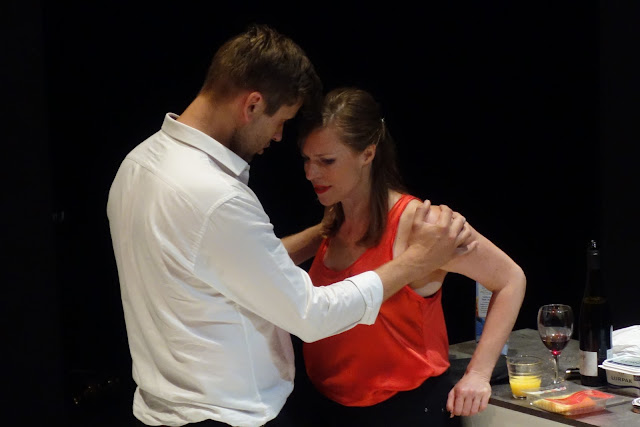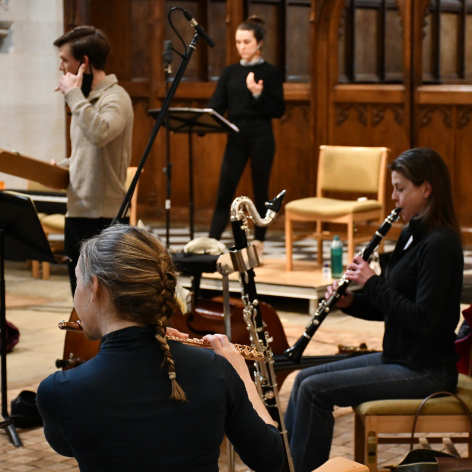 |
| Joseph Phibbs: Juliana - Samuel Pantcheff, Cheryl Enever at the premiere in 2018 (Photo Laurie Slade) |
Joseph Phibbs' opera Juliana, with a libretto by Laurie Slade, was a joint commission from Nova Music Opera, the Cheltenham Festival and the Presteigne Festival in 2018 and was premiered by George Vass and Nova Music Opera Ensemble at the Cheltenham Festival. Vass and Nova Music Opera Ensemble have now recorded the opera for Resonus Classics with soloists Rebecca Afonwy-Jones, Felix Kemp, and Zoe Drummond. The opera, a modern interpretation of August Strindberg's play, Miss Julie, is Joseph Phibbs' first opera. I recently met up with him to chat about Strindberg, Miss Julie, and creating opera.
 |
| Joseph Phibbs (Photo Malcolm Crowther) |
Miss Julie has formed the source for previous operas including ones by William Alwyn (1905-1985) and Ned Rorem (born 1923). Though Joseph was aware of these earlier operas, he never heard them until after he had written Juliana. But there again, so many subjects have been done before, and Joseph feels that the updating of the story provides a new angle. Laurie Slade wrote the text from scratch. The setting is still Sweden, but the characters names have been changed and the aristocratic setting has been replaced by the house of a wealthy CEO with a daughter, Juliana, who is damaged and goes wrong by transgressing boundaries. She has a relationship with one of the servants, Juan, and both she and Juan are damaged individuals, both with different expectations, and this precipitates her suicide.
One of Joseph's problems with Strindberg's original is the cause of the heroine's suicide. Miss Julie commits suicide because she has slept with a servant. But in the new opera, her drug addiction and past abuse by her father provide a plausible reason for her to take her life, with the relationship with Juan being the last straw as he persuades her to commit suicide. The third role is Kerstin, the housekeeper, who has a chorus-like role. She reflects on what is going on; she is the most stable person of the three, religious and the voice of reason.
Joseph used different types of music to represent different themes in the piece and to colour the characters. Juan is Latin American so this is reflected in both his vocal lines and the orchestration (which uses lots of percussion). Kerstin's music reflects the theme of the natural world with the use of soft strings. Julian is more volatile, her music is fragmentary including jazzy elements and seductive moments, including a love duet and music that is unashamedly lyrical.
 |
| Laurie Slade |
Joseph comments that opera is an entirely artificial form, far more so than a play, after all, we do not communicate by singing. So the libretto needs to have its own artifice. Ironically, the play is naturalistic, whilst Laurie Slade's libretto has writing that is poetic (partly because prose did not work for Joseph). Laurie Slade has distilled the language down and found different types of language - rhyming, lyrical yet not rhyming, concise declamation. Thus there is a great range of language for Joseph to set.
Juliana is Joseph's first opera, before it, he had had no opportunity to write one. A lot of his music has been performed at the Presteigne Festival, and there were discussions about an opera that came to fruition with the commission for Juliana. Looking back, Joseph is glad he had the chance to write a lot of vocal music (including six song cycles), which means had brought to the opera a decent amount of experience writing for the voice. He feels lucky to have had two amazing casts, Cheryl Enever, Samuel Pantcheff and Rebecca Afonwy-Jones at the premiere, Zoe Drummond , Felix Kemp, and Rebecca Afonwy-Jonesin the recording. He is hoping that the recording will encourage other opera companies to perform the work, as it only uses three singers and eight instrumentalists. They will be approaching companies, including those in Scandinavia.
Joseph admits that he would love to do a large scale opera, but he is thankful he has written a chamber piece first, and he has been discussing ideas with Laurie Slade.
He wanted to make Juliana a vocal opera, not declamatory, he also wanted to set the language so that it can be understood. In his vocal music, Joseph enjoyed setting Edith Sitwell's work, particularly her late, mystical work. He likes language that is timeless, suggestive, ambiguous and sometimes surreal. Another poet he mentions is the late Nicholas Heiney who died in his early 20s; Heiney was the son of radio presenter, journalist and author Libby Purves, who published a volume of her son's writing, The Silence at the Song's End, which inspired Joseph's 2008 song cycle of the same name. He also mentions the mystical poetry of Kathleen Raine (1908-2003), which leaves space for music, whereas though Joseph love's T. S. Eliot's poetry, he finds it difficult to set. It is all about the qualities of the language.
 |
| Steven Stucky & Joseph Phibbs in 2013 |
He describes his music as harmonically triadic and modal, but not conventionally diatonic. He uses harmony that allows modulation but also uses sequences and patterns. He is fond of older forms such as fugue and sonata form, but looking at them differently and he cites the example of Benjamin Britten. Apart from Britten, other musical heroes include Witold Lutosławski (1913-1994), with Joseph mentioning his later music with its synthesis of the experimental and the lyrical, and Joseph's teacher, the American composer Steven Stucky (1949-2016), for his harmonic transparency, clarity and textual beauty. Joseph feels that a lot of people don't know Stucky's music, and they should. Not only was he a lovely human being, but his music is so important and so wonderful. Stucky was an expert on Lutosławski and authored the 1981 study Lutoslawski and His Music. He also was curator of the Philharmonia Orchestra's 2013 centenary celebration of that composer, Woven Words: Music Begins Where Words End.
Whilst Joseph studied cello and piano, he wrote music from the age of ten, and by the age of 14, he was determined to be a composer. He studied at the Purcell School, where he received his first formal composition lessons, and then went to Kings College, London where he studied with Sir Harrison Birtwistle. He then took a year out, writing theatre music, after which did a doctorate at Cornell University in the USA, where he studied with Steven Stucky for four to five years. Going to the USA changed Joseph's music a lot. Before the American trip, he wrote modernist music in Boulezian style, whereas afterwards, his music became more lyrical under the influence of Lutosławski and Steven Stucky.
Ten years ago, Joseph wrote his first string quartet for the Piatti Quartet, now he has been commissioned by the Richard Thomas Foundation for another quartet, Joseph's fourth, for the Piatti Quartet. Whilst Joseph does indeed enjoy the string quartet form, a composer cannot always choose what they are asked to write. So, a year after his first quartet, he wrote his second for the Navarra Quartet and then his third for the Belcea Quartet in 2018. Though Joseph initiated the creation of the fourth quartet as he wanted to do something different with the quartet form.
 |
| Joseph Phibbs: Juliana - recording session in March 2021 |
Looking ahead, he is writing a cello concerto for Guy Johnston, who is the artistic director of the Hatfield House Music Festival. Joseph's cello sonata for Guy Johnston was a co-commission from the Festival and the Wigmore Hall. Johnston premiered it at the Festival in 2021; it has already received its US premiere, the sonata will be performed at the Wigmore Hall later this year. Joseph is also writing a piece for Suzi Digby and the ORA Singers, to be performed later this year.
Joseph Phibbs Juliana
Zoe Drummond (soprano)
Rebecca Afonwy-Jones (mezzo-soprano)
Felix Kemp (baritone)
Nova Music Opera Ensemble, George Vass
Resonus Classics
[Amazon]
Never miss out on future posts by following us
The blog is free, but I'd be delighted if you were to show your appreciation by buying me a coffee.
Elsewhere on this blog
- Opera scenes from the Young Artists of the National Opera Studio with the orchestra of English National Opera at Cadogan Hall - concert review
- Beauty and bleakness: Douglas Knehans' Cloud Ossuary from Brno Philharmonic Orchestra and Mikel Toms - record review
- The Art of Transformation: inspired by a Scottish Border ballad Alastair White's Woad is very much an opera for our times - record review
- A sense of ritual: Edward Jesson's Syllable, a work of complex musical theatre, is premiered by Trinity Laban Opera - opera review
- Still in cracking form: Verdi's Nabucco returns to Covent Garden - opera review
- The sense of eternity that can be found in the simple doing of something: Sven Helbig's Skills - interview
- In stunning control of his material: Gavin Higgins' Ekstasis from Piatti Quartet, Fidelio Trio, Thomas Gould, David Cohen, Sara Roberts - record review
- Personal Stories: Cevanne Horrocks-Hopayian's Welcome Party on NMIC - record review
- Panache, intensity and vivid story-telling from Claire Booth and Christopher Glynn in Modest Musorgsky: Unorthodox music at Wigmore Hall - concert review
- A joy in complexity of texture and rhythm: Sinfonietta Riga in four recent works written for them by Lativan composers - record review
- We live in a world where nothing has been left untouched by humanity: composer Jan-Peter de Graaff chats about the inspirations for his new cello concerto - interview
- Colour and movement: Patrick Allies and Siglo de Oro transport us to 17th century New Spain - concert review
- Home

![Joseph Phibbs Juliana - Zoe Drummond, Rebecca Afonwy-Jones, Felix Kemp, Nova Music Opera Ensemble, George Vass - Resonus Classics [Amazon] Joseph Phibbs Juliana - Zoe Drummond, Rebecca Afonwy-Jones, Felix Kemp, Nova Music Opera Ensemble, George Vass - Resonus Classics [Amazon]](https://blogger.googleusercontent.com/img/a/AVvXsEijjRMar34ToNgD7DDqqTEWt7pldzNxbJ82WsGVUqYj6mr9qS3RqmoRADrztVeBIAKJhO0ofmCaoB6QxkFHfUXVdsWBX5JVk3Ue3_dY-WKNQAmIGrnqcs-aIZBP9Ge0pSj2_9XuhBSDKZvfrIqssu3pAgj7wMwTG7S-pi95TZKVKrSVGmvPnIA=w320-h320)










No comments:
Post a Comment